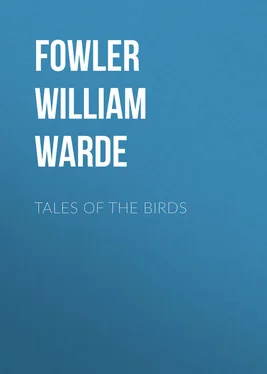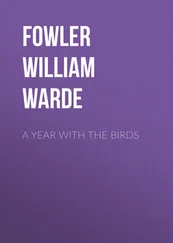William Fowler - Tales of the birds
Здесь есть возможность читать онлайн «William Fowler - Tales of the birds» — ознакомительный отрывок электронной книги совершенно бесплатно, а после прочтения отрывка купить полную версию. В некоторых случаях можно слушать аудио, скачать через торрент в формате fb2 и присутствует краткое содержание. Жанр: foreign_antique, foreign_prose, на английском языке. Описание произведения, (предисловие) а так же отзывы посетителей доступны на портале библиотеки ЛибКат.
- Название:Tales of the birds
- Автор:
- Жанр:
- Год:неизвестен
- ISBN:нет данных
- Рейтинг книги:3 / 5. Голосов: 1
-
Избранное:Добавить в избранное
- Отзывы:
-
Ваша оценка:
- 60
- 1
- 2
- 3
- 4
- 5
Tales of the birds: краткое содержание, описание и аннотация
Предлагаем к чтению аннотацию, описание, краткое содержание или предисловие (зависит от того, что написал сам автор книги «Tales of the birds»). Если вы не нашли необходимую информацию о книге — напишите в комментариях, мы постараемся отыскать её.
Tales of the birds — читать онлайн ознакомительный отрывок
Ниже представлен текст книги, разбитый по страницам. Система сохранения места последней прочитанной страницы, позволяет с удобством читать онлайн бесплатно книгу «Tales of the birds», без необходимости каждый раз заново искать на чём Вы остановились. Поставьте закладку, и сможете в любой момент перейти на страницу, на которой закончили чтение.
Интервал:
Закладка:
What was this? Human voices, laughter, coming round the corner of the barn! Feltie had never been so near a human being before. He tried to fly, but it was impossible; no strength was left. His heart beat, and he crouched closer to the ground. Then two small ploughboys, shouting and snowballing each other, burst round the barn; the foremost, seeing Feltie, at once ran up and seized him, thus offering a splendid aim to his pursuer, who sent a snowball at him which took deadly effect on him. But the first boy popped Feltie into his pocket, and ran off, crying out as he ran:
“I’se got a bird: thee sha’n’t have none of un!”
Down the village street he ran, making for his father’s cottage, but had got no farther than the vicarage gate, which was half way down the street, when another well-compacted snowball, delivered from behind the gate, knocked his hat off into the road, and filled one ear with snow which at once began to trickle gently down his neck. He looked up with a red face, and saw the vicar’s son, a boy of fourteen, swinging on the gate and laughing with all his might.
“Oh, that was a beauty!” he said: “Oh, that was a tickler for you, Bill!”
“Thou beest a beast,” was Bill’s reply. He didn’t mean a pun, but perhaps there was a pleasant emphasis in the doubled syllable. “Thou beest a beast, thou beest.”
“What’s that?” said the swinger on the gate suddenly jumping down. “What am I? I’ll teach you – ” But Bill did not stop to hear what he was to be taught. He took to his heels again and ran like a deer. But the vicar’s son was more than a match for awkward Bill at running, and in less than a hundred yards he collared him and had him down in a twinkling on the snow in the deserted street.
“I’ll teach you to call me names, you young cad.” And he began his lesson by scientifically “bagging” Bill’s wind.
“Doan’t thee pummel I, doan’t thee now,” said panting Bill. “I’ll gi’ thee a bird I’se got in my pocket, if thee woan’t pummel I no more.”
“Where’s the bird? Get up and show it me directly, you young lubber,” said his conqueror, keeping a fast hold of his prisoner’s collar, the better to secure the execution of the bargain. Bill sulkily obeyed, and produced Feltie from his pocket. But the jolting and banging produced by Bill’s headlong flight in his heavy hob-nailed boots had been too much for Feltie; he still breathed, but his eyes were shut and he was in fact quite unconscious of what was going on. The vicar’s boy let go Bill’s collar, and taking Feltie in both hands, began to walk back to the vicarage gate.
In two minutes he and Feltie were in the snug warm drawing-room of the vicarage, where his mother and three sisters were sitting by the fire at work.
“My dear George,” said the mother from her armchair as the boy came in, “how can you go out a day like this without a greatcoat? And what in the world have you got there?”
“Don’t be frightened, mother,” said George, as he sat down on the hearthrug to thaw; “it’s only a fieldfare.”
“What is a fieldfare, George?” asked his youngest sister.
“First of all, Miss Minnie,” answered George, “a fieldfare is a bird; secondly, it’s a kind of thrush; thirdly, it only comes here in winter; fourthly, it eats berries; and fifthly, if you don’t go and get some brandy quickly, this one will die, for it’s all skin and bone, and hasn’t had the ghost of a berry inside it this last week, I should say.”
“Brandy, George! Who ever heard of a bird drinking brandy!”
“Now do you ladies want to save this bird’s life, or do you not?” said Master George impatiently. “Because if you do, Minnie will go and shut up the cat and dog, and Edith go and get some drops of brandy, and Katie will get me a quill pen to pour the brandy down his throat with, and mother – ”
“And mother will take care of the bird until George has changed his jacket, for he’s dripping on to the hearthrug like old Father Christmas,” said the mother, and quietly took Feltie out of his hand into her lap, where she began to stroke him gently. “Now, George, make haste, or he’ll die before you’re down again.”
They all ran off on their several commissions, and when George came down again, still putting on his jacket in his hurry, they were all assembled round the mother, who had Feltie on a napkin in her lap, and was cutting a quill pen into a proper shape for giving him the first and last medicine he ever had in his life. George held the bird’s beak open, while she deftly contrived to slip a single drop of brandy in half a teaspoonful of water down his throat; in five minutes she gave him another dose, and then another; and now Feltie’s eyes opened wide, and his feathers began to quiver slightly all over him.
“Now, mother, put your two hands over him, and keep him quite warm for a bit. He’ll do, I expect,” said George.
It was a bold experiment to give a bird brandy-and-water, but on this occasion it answered its purpose. In another hour or two Feltie was able to eat a few shreds of meat, which were given him at the suggestion of the vicar, who had now come in, and was taking much interest in his recovery. Then he wanted to go to sleep, but the bright light of the room made him feel very uncomfortable, and the loud human voices sounded harsh and strange in his ears. There was much discussion as to where he should be put for the night; but the vicar decided that he should sleep in the conservatory, which was warmed with hot water. So they carried him there in procession, and left him in a warm corner on a heap of the gardener’s matting, with plenty of scraps of meat and crumbs, and a saucer of water if he should be thirsty in the night. So Feltie fell fast asleep, and dreamt of poor Cocktail all alone and frozen under the gorse on Salisbury plain; and George too fell fast asleep in his snug bed, and dreamt that a whole flock of fieldfares were come to the vicarage, asking for brandy-and-water to be given them with a quill pen.
Next morning George was down betimes, half dressed, and in a state of great excitement, to see how his fieldfare was getting on. But Feltie was awake still earlier, and had already taken his breakfast when George opened the conservatory door. He felt quite strong again, and with his strength had returned all his dread of human beings. So no sooner was the boy inside the door, than he began to flutter among the plants, and then flew up to the glass roof and tried to struggle through it. Then he came down again, and smelling the fresh air coming through the door, was attracted in that direction, and in another minute was free. Off went George after him – over the garden wall, where he dropped a slipper, for he had not had time to put on his boots; across the road, through the hedge, which tore his trousers and scratched his face; over the orchard, and up into the stubble-field beyond, where a shepherd who was tending the new-born lambs that had been dropped in spite of the snowstorm, was much astonished to see the vicar’s son tearing along without a hat, without his boots, and with his usually neat collar flying behind him secured by only a single button. But still Feltie went on, and George, seeing that he was able to shift for himself, gave up the pursuit, and consoled himself by a talk with the shepherd about the young lambs and their mothers, before he went home to dress and tell his tale.
Meanwhile Feltie had perched on a hedge some distance away, and began to look about him. “What was this he felt? Surely it was not so cold, and the wind was blowing gently from the south-west. Was not the snow melting?” (Master George’s right foot had found that out as soon as he got over the garden-wall.) “Was not it beginning to rain?”
Читать дальшеИнтервал:
Закладка:
Похожие книги на «Tales of the birds»
Представляем Вашему вниманию похожие книги на «Tales of the birds» списком для выбора. Мы отобрали схожую по названию и смыслу литературу в надежде предоставить читателям больше вариантов отыскать новые, интересные, ещё непрочитанные произведения.
Обсуждение, отзывы о книге «Tales of the birds» и просто собственные мнения читателей. Оставьте ваши комментарии, напишите, что Вы думаете о произведении, его смысле или главных героях. Укажите что конкретно понравилось, а что нет, и почему Вы так считаете.












